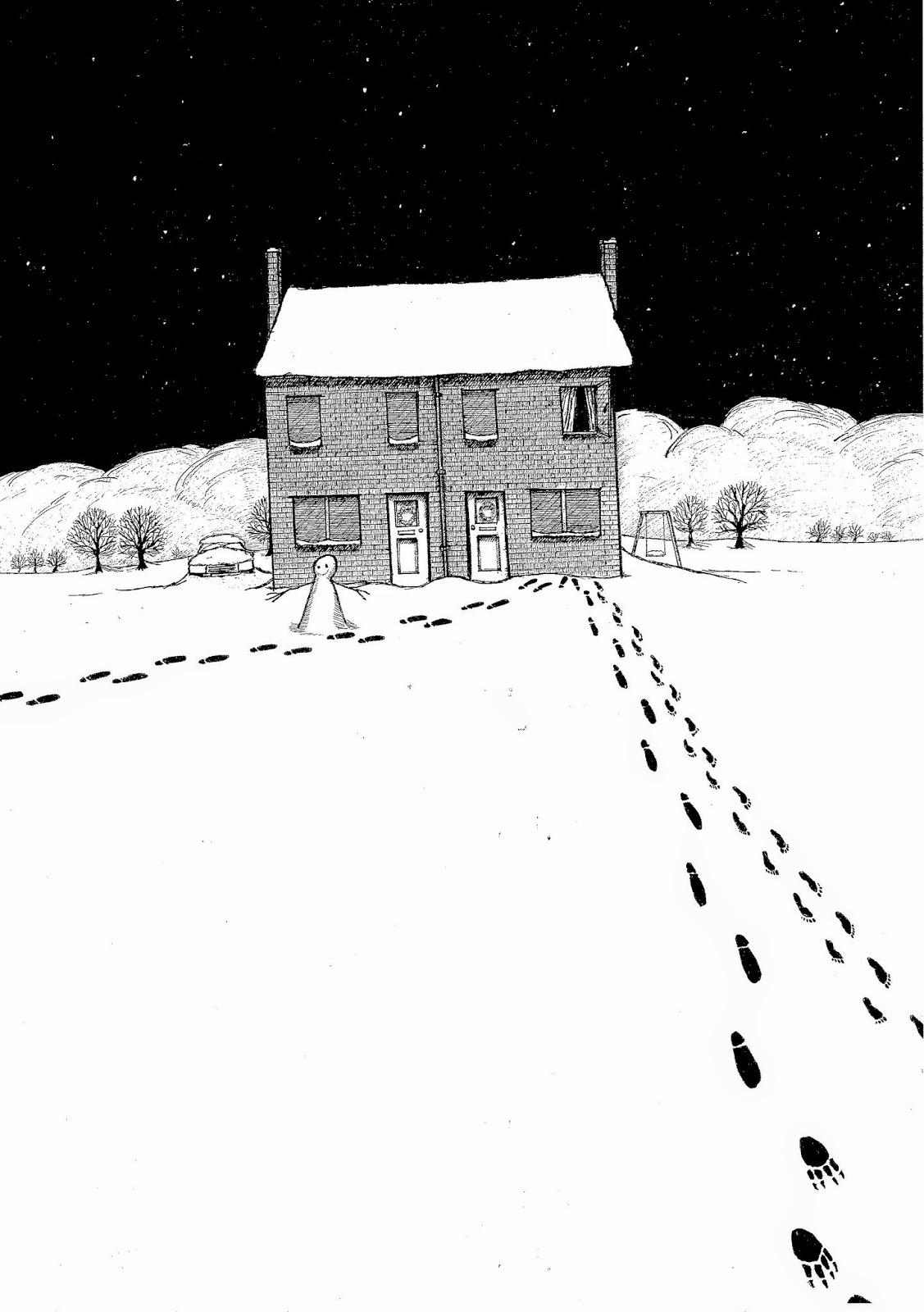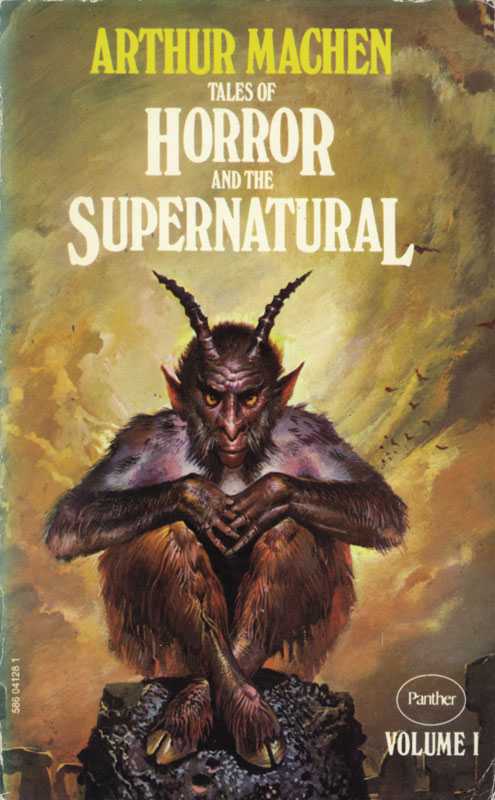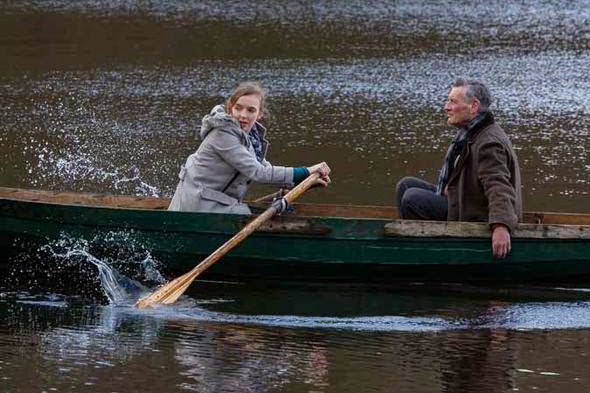Author Helen Grant has
published a list of ten classic ghost stories for Christmas. It is also, as you'd expect from a very accomplished writer of spooky fiction, an excellent introduction to the ghost story for anyone who'd like to give it a go. In fact, of the ten stories listed, only one - 'The Accident' by Ann Bridge - is unfamiliar to me.
But there are so many good stories, so many brilliant authors! So I thought I'd list ten ghost stories by other writers, just to demonstrate what a wonderful range of material is out there. Like Helen, I'm stretching the definition of 'ghost story' to mean 'tale of the supernatural'. (She lists 'Canon Alberic's Scrap-Book' and Conan Doyle's 'Lot No. 249', neither of which has a ghost. Marghanita Laski's 'The Tower' seems debatable as well.)
Right, here goes...
 1. 'Blackham's Wimpey' by Robert Westall
1. 'Blackham's Wimpey' by Robert Westall (From
Break of Dark)
A superb example of the historical ghost story, this the tale of a haunted Wellington bomber and the way a brave Irish pilot manages to exorcise its terrors. Westall evokes the ambience of a World War 2 RAF base and the differences in attitude between Blackham, a bloody-minded commander, and more humane officers. The scene when the crucial air-battle occurs over Germany is extraordinary in its vividness, as is the story's finale.
 2. 'Vlasto's Doll' by Margery Lawrence
2. 'Vlasto's Doll' by Margery Lawrence (From
Nights of the Round Table)
One of the few convinced Spiritualists to write really good supernatural fiction, Lawrence produced several first-rate collections. Nights of the Round Table, as the title suggests, concerns a story-telling club. Every month a member gives his account of a strange occurrence. 'Vlasto's Doll' is arguably the oddest. The central idea may not be original, but the execution - in both senses of the term - is weird and disturbing enough for anyone. And big dolls are just creepy. Really.
 3. 'Minuke' by Nigel Kneale
3. 'Minuke' by Nigel Kneale (From
Tomato Cain & Other Stories, also collected in
The Eleventh Pan Book of Horror Stories)
If you've seen Kneale's TV drama The Stone Tape you will readily grasp the idea of a haunted house as a place of ancient evil. 'Minuke', written before the author moved into broadcasting, is a very effective and atmospheric tale, with a touch of the author's macabre humour. I probably over-use the term nightmarish, but it's certainly applicable in this case. The whole collection is worth seeking out.
 4. 'The Moonlit Road' by Ambrose Bierce
4. 'The Moonlit Road' by Ambrose Bierce
Often collected but not readily explained, this is one of the few ghost stories that breaks a cardinal rule of genre and gets away with it. What really happened in an isolated house when a loving wife and mother was murdered, apparently by a random intruder? A study in unhappiness and regret, it's a sensitive and intelligent story, like many of Bierce's best. A splendid, if rather oddly shaped, piece of American Gothic.
 5. 'The Door in the Wall' by H.G. Wells
5. 'The Door in the Wall' by H.G. Wells
One of the few great supernatural tales that doesn't set out to scare you, Wells' story of a man haunted by a childhood vision of beauty and kindness is a little masterpiece. The definitive tale of a 'land of lost content', it can be interpreted as a yearning for Utopia, or a regretful rejection of Utopianism. However you read it, though, it showcases the talents of a great - and still under-appreciated - English writer.
 6. 'Ancient Sorceries' by Algernon Blackwood
6. 'Ancient Sorceries' by Algernon Blackwood (From
John Silence: Physician Extraordinary, and many anthologies)
Ghosts! Witches! Reincarnation! Cats! Sexy-sexy, ooh la la (within established Edwardian fictional limits)! Yes, it's all here in a tale of a sleepy French town whose inhabitants have markedly feline characteristics. An Englishman who gets off his train on an impulse and spends a few days among the natives finds he has more in common with them than he could have imagined. Vintage stuff, not least because Blackwood seems a bit ambiguous about witchcraft.
 7. 'Luella Miller' by Mary E. Wilkins Freeman
7. 'Luella Miller' by Mary E. Wilkins Freeman
She was a very prolific author of short stories, many of them spooky, and all set in the small-town or rural New England she knew so well. She was very good on dialogue and telling imagery. 'Luella Miller' is a classic and rather early example of a sub-genre that has since been very popular. I'll say no more, except that Luella is someone who needs a lot of help, and always seems to find a likely helper. A gentler story than some, but still a weird one.
 8. 'All Hallows' by Walter de la Mare
8. 'All Hallows' by Walter de la Mare
Not an easy writer to modern sensibilities, de la Mare was a poet whose stories are elusive and often very strange. 'All Hallows' is at least comprehensible. A cathedral standing alone by the sea is beset by demonic forces in a surprising way. A story of powerful scenes that might best be enjoyed as symphonic 'movements', this one will either stay with you forever or leave you cold. If you want the best modern edition of de la Mare's weird fiction, I'd recommend the Tartarus Press volume
 9. 'Petey' by T.E.D. Klein (in Dark Gods)
9. 'Petey' by T.E.D. Klein (in Dark Gods)
Klein writes very little, but the four novellas in Dark Gods are among the best horror stories of the late 20th century. Of them, 'Petey' is almost a traditional ghostly tale; a group of wealthy, self-indulgent people who gather at a house in the wilds. The house was essentially stolen (albeit legally) from its rightful owner by their host. Evidence of strange beliefs and experiments emerge during the course of the house warming party...
 10. 'A Tress of Hair' by Guy de Maupassant (aka 'The Head of Hair')
10. 'A Tress of Hair' by Guy de Maupassant (aka 'The Head of Hair')
Maupassant is well worth exploring, as he was a master of the short story and wrote a lot of truly weird tales. Here, an apparently stable and single man collects antique furniture. He discovers a secret panel in a Venetian piece (type never specified) of the 17th century. Inside is 'an immense coil of fair hair, almost red, which must have been cut off close to the head, tied with a golden cord'. The hair's long-dead owner soon manifests herself. The tale of a sensuous ghost, or an account of obsession leading to madness? You decide.





